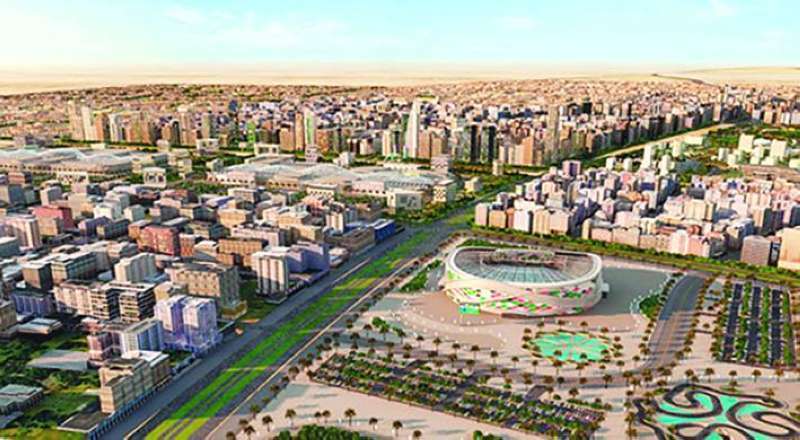Latest News
- Municipality Shuts Store And Issues 23 Violations
- Kuwaiti Tweeter Jailed For Insulting Rulers, Judiciary, And Nati...
- MoH Opens Registration For Scholarships And Study Leaves
- 10,000 Patients And 1,600 Surgeries Were Treated At Al-Babtain B...
- Kuwait Railway Project Delayed By Committee
- Kuwait University Attains WHO Accreditation As Healthy Universit...
- Suspect In Jleeb Al-Shuyoukh Murder Case Arrested By Kuwaiti Aut...
- The Ministry Connects With Violators Of Residency Law In Eight L...
- Kuwait Welcomes Armenia-Azerbaijan Border Agreement For Regional...
- Despite Tough Laws, Chaos Seen On Roads
- Body Of Asian National Found In Jleeb Al-Shuyoukh Area
- Ministry Of Commerce And Industry Launches 6 New Electronic Serv...
Kuwait's Housing Demand Will Exceed Its Supply Until 2026

The Economist Intelligence Unit mentioned Kuwait's housing crisis, noting that the government recently approved 2.1 billion dinars in funding for the South Saad Al Abdullah housing project, which is one of the projects being built on the outskirts of the capital to alleviate the shortage in this area.
However, according to a local Arabic daily, the unit estimates that housing demand will continue to outstrip new house supply until 2026, while political gridlock continues to obstruct critical adjustments to the market's fundamental imbalance.
The chronic housing shortage for Kuwait's young population, which is rapidly growing, has long been a source of resentment, according to housing sources, because waiting times for government housing have gotten longer, often by a decade or more, with a backlog of requests from more than 100,000 people who want to get housing.
As part of the rich advantages enjoyed by Kuwaitis, every Kuwaiti couple, regardless of their income, is entitled to land for the construction of a home and a 70,000 dinar credit from the credit bank that is interest-free.
However, due to a lack of supply and speculation fueled by strong investment returns, prices in the private housing sector have risen to more than 20 times the average yearly wage, putting most Kuwaitis out of reach.
The Economist Intelligence also stated that real estate finance was restricted as a result of consecutive governments' inability to ratify a draught mortgage law that was published in the National Assembly in mid-2020 owing to the continuous political crisis.
The government pays a portion of the interest on commercial bank housing loans under this law. The government's move to pump 800 million dinars in liquidity into the Credit Bank in January was expected to have just a little influence on the situation, according to the institution.
With the recovery of world oil prices, it expects there will be a slight acceleration in addressing the supply side, allowing for an increase in capital expenditure.
It reported Finance Minister Abdulwahab Al-Rasheed as saying that housing is a priority for the government during his announcement of the financing of the South Saad Al-Abdullah project (which would be spread over multiple annual budgets) (the current caretaker government resigned in early April).
Under a cooperative project agreed upon in 2016 between the Public Corporation for Housing Welfare and a South Korean consortium, the project, which spans 59 square kilometres, would feature at least 25,000 housing units developed on the basis of a "smart city."
The primary Chinese contractor handed delivered the second batch of housing units in the South Al-Mutla'a project in Jahra Governorate in March 2021, which is the largest planned project, covering 120 square kilometres and providing homes for 400,000 people when finished.
High oil prices and public pressure, according to Economist Intelligence, will lead to an increase in government spending on housing, particularly in 2022-2024, stimulating the building sector.
At the same time, she noted that ongoing project delays and the failure to implement key system reforms as a consequence of persistent conflicts between the administration and the National Assembly will stymie development and fuel societal unrest.
Trending News
-
 Eid Al Fitr 2024: Crescent Moon Not Sighted In Sau...
08 April 2024
Eid Al Fitr 2024: Crescent Moon Not Sighted In Sau...
08 April 2024 -
 Kuwait Implements Home Biometrics Services Ahead O...
14 April 2024
Kuwait Implements Home Biometrics Services Ahead O...
14 April 2024 -
 When Will Eid Al Fitr 2024 Take Place In Qatar, Ba...
08 April 2024
When Will Eid Al Fitr 2024 Take Place In Qatar, Ba...
08 April 2024 -
 Kuwait Airways Provides Update On Flight Schedule...
14 April 2024
Kuwait Airways Provides Update On Flight Schedule...
14 April 2024 -
 Kuwait Airways Introduces Convenient Home Luggage...
15 April 2024
Kuwait Airways Introduces Convenient Home Luggage...
15 April 2024 -
 Expat Residency Law Amended By Kuwait Ministerial...
20 April 2024
Expat Residency Law Amended By Kuwait Ministerial...
20 April 2024 -
 Gathering For Eid Al-Fitr Prayers: Kuwaiti Citizen...
10 April 2024
Gathering For Eid Al-Fitr Prayers: Kuwaiti Citizen...
10 April 2024 -
 Two Expats Are Arrested For Stealing From Salmiya...
17 April 2024
Two Expats Are Arrested For Stealing From Salmiya...
17 April 2024 -
 Bay Zero Water Park Kuwait: Summer Season Opens Ei...
11 April 2024
Bay Zero Water Park Kuwait: Summer Season Opens Ei...
11 April 2024 -
 An Egyptian Expat Dies At Kuwait's Airport
11 April 2024
An Egyptian Expat Dies At Kuwait's Airport
11 April 2024












Comments Post Comment